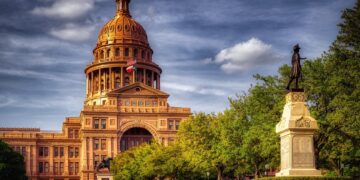The fighting has just begun. With their victory in Charleston, South Carolina, the British set grander sights– toward establishing authority across all the Southern colonies. The colonies here would be a handsome prize for King George. It is a land rich in lucrative crops like tobacco and rice and, by all accounts, full of
Colonists loyal to the Crown. The British expect to find little resistance. Here, at last, they would find colonists loyal to the king and eager to embrace the British Empire, especially for its protection and trade. >> By moving south, they were moving to an area where they hoped that they could finally restore
British authority and put the Loyalists in charge. The goal was always to try to isolate the rebellion. The assumption was that most colonists, given the chance, would be Loyalists. >> Herrmann: For four years, the British have tried to find those colonists loyal to the Crown. For four years, they have encountered an America
Deeply divided. But now, down South, they believe they have their strongest foothold. The South needs England, and England needs the South. They will drive their strategy toward the backcountry. Into this frontier, the British send one of their most effective and ambitious officers, Colonel Banastre Tarleton. He is destined to become
A household name in the South… only it will not be for bravery but for brutality. >> Tarleton is known for his daring, for moving his cavalry quickly and the troops, quick hits. He’s also known for just– for no restraint. He’s a little bit of a dandy, which was appropriate for that era.
But he fights like a Tasmanian devil. >> Herrmann: The British will not only raise and train a loyalist militia to keep peace in the South. They will hunt down rebels and destroy them. No one is better suited to that task than Tarleton. 100 miles from the coast,
He closes in on the remains of the Continental Army in retreat from their defeat at Charleston. With great speed and agility, Tarleton’s British cavalry catches up to a regiment of 350 Continentals under the command of Colonel Abraham Buford. He pursues them to a town called Waxhaws. Tarleton sends Buford a deadly threat.
>> “You are now encompassed by a corps of 700 light troops on horseback. Half of that number are light infantry with cannon, the rest cavalry.” –Banastre Tarleton, British officer. >> Herrmann: It’s a bluff. Tarleton has no more than 200 men, but they are his best soldiers, well trained in the bayonet and saber.
Buford, sure that he has the greater numbers, doesn’t back down. >> “Sir, I reject your proposals. I shall defend myself until the last extremity.” –Colonel Abraham Buford. >> Fire! >> Herrmann: Buford’s words will prove prophetic. The Americans are able to fire just a few volleys before they are overrun.
But Tarleton doesn’t stop there. As the rebels raise the white flag of surrender, he continues a ferocious attack, cutting down enemy soldiers even as they lay down their arms. It will soon be remembered as the Waxhaws Massacre. >> “Our captain attempted to defend his head with his left arm
Until the arm was hacked off. His head was then laid open to the eyes.” –Continental soldier. >> Herrmann: Waxhaws is a painful loss for the Americans. But they will turn their defeat into another kind of victory: on the propaganda front. >> The battle of the Waxhaws is used by Patriot propagandists
To depict the British as monsters who will massacre their soldiers in a dishonorable fashion and ride roughshod over the countryside. Any occupying force trying to subdue a rebellion on the home soil of an insurgency is going to operate at a disadvantage when it comes to the propaganda war. >> Herrmann: Waxhaws
Will be remembered and used as a battle cry against the British. It sets the tone for the divisive war coming in the backcountry. Banastre Tarleton receives a reprimand from his superiors, but they do little else to rein him in. The man now known as Bloody Ban continues deeper into the
Backcountry, where the British are about to dig themselves an even bigger hole. In an effort to shore up loyalty and frighten would-be rebels, the British issue an ultimatum to Southerners. >> “All persons who shall neglect to return their allegiance to His Majesty’s government will be considered as enemies and rebels and treated accordingly.”
>> Huzzah! God save the king. >> In most parts of the country and in most years of the revolution, people had been able to stay out of the way, at least partially. But now it was do or die. >> Herrmann: The severe proclamation is the work of Sir Henry Clinton, the overall
Commander of the British forces in America. Clinton should have known better. Back in 1776, the British issued nearly the same document in New Jersey, banking on strong Loyalist sentiment. It backfired then, and it will backfire now. >> The verity here, if there is one, is, if you’re going to push
Someone off of the fence, you ought to be pretty certain which side of the fence they’re going to fall on. >> all: Huzzah! >> Herrmann: Now everyone must choose: for or against, Loyalist or Patriot. Old rivalries and fresh wounds inform their choices. The British have created a tempest in a teapot.
The Loyalists who do come out to join the fight for the king do so for their own agendas. And they will soon be met by an equal force– equal in number and violence– of Patriots. A hornet’s nest is stirred in the South, unleashing a fight that looks less like a revolution
And more like a civil war. >> Herrmann: The British Army now moves deeper into the Carolina backcountry. Having declared, in a misguided proclamation, anyone not a friend an enemy, they intend to back up their words with force. But resistance is deeper than they think. Late June 1780. British commander
Sir Henry Clinton has lived in Charleston for a month now and can sense trouble brewing in the wilderness. His response: leave for New York and turn the Southern command over to another officer. [church bell tolling] London, England. The man who will replace Clinton is no stranger to the American war.
General Charles Cornwallis will soon return to the colonies but a changed man. He has been in England to bury his beloved wife. Now, with her passing, Cornwallis can think only of escaping his memories, going back to the one place, he hopes, will be a tonic for his grief. >> He is devastated and,
Like many men, throws himself back into his work. In Cornwallis’ case, it was the work of fighting the war. >> Herrmann: Whether he wins or loses in the colonies is no longer the point. >> “I am now returning to America not with views of conquest and ambition. Nothing brilliant can be
Expected in that quarter. But I find England quite unsupportable to me. It has now no charms for me. I must shift the scene.” >> Herrmann: But Cornwallis will find the war in America changed too from how it had been fought up North. The British forces on the ground are moving further and
Further into unknown territory, a wild country made up of remote farms, simmering with rivalries. This is not the South of wealthy ports and rich rice farms. This is the South of fetid swamps and untamed frontiers. Here, loyalties are not so clear. Those who might be Loyalist, like everyone in this backcountry frontier,
Harbor grudges the British don’t understand. Decades of land disputes and old animosities carried to the New World by each successive wave of immigrants have poisoned the territory. All it takes is the presence of war to seriously stir things up. The South soon crawls with men like David Fanning. A struggling farmer, he had
Been robbed of everything he had two years back by a group claiming to be Patriots. Now, with a powerful British mandate to ride under, he devotes himself to vengeance. [dramatic music] Fanning also gathers more like him. Loyalist militia swarm over the backcountry with their campaign of terror. They are less interested
In the outcome of the revolution than in the chance to pillage and grab land from their patriot neighbors. >> “I heard the horses coming in such a furious manner, but I’d no time for thought. They were up to the house, entered with drawn swords and pistols in their hands, crying out, ‘Where are
These rebel women?’ They then began to plunder the house of everything they thought worth taking.” –Eliza Wilkinson. >> Herrmann: Patriots soon join the fray. Men like Thomas Sumter, a former Continental soldier, take up their arms to battle the Loyalists. Stirred out of what he hoped would be retirement,
Sumter gets back into the fight for personal reasons too. His house had been targeted by Loyalists. For him, as with men on both sides, the cause of independence takes a backseat to payback and plundering. >> In the South, it’s American against American. There are entire battles fought–in fact, there are 103 different battles
In South Carolina alone– where there’s nary a Brit in sight. This is Tory militia against Patriot militia. >> Herrmann: Each side attempts to outdo the other in terror and brutality. Whipping, tar and feathering, and a particularly gruesome device called the spigot becomes as commonplace as revenge. >> “A Loyalist was placed
With one foot upon a sharp pin and turned around. As cruel as this punishment might seem to those who never witnessed the unrelenting cruelties of the Loyalists, I viewed the punishment with no little satisfaction.” –Charles Gibson, Southern Patriot. >> When the blood started to flow, it was revenge and counterrevenge. One killing provoked
A counterkilling. It really tapped into these prerevolutionary resentments and conflicts. It’s like a fire feeding itself. >> Herrmann: It is, in short, a civil war. The entire strategy was failing for Cornwallis and the British, producing not peace and order but chaos and retribution. >> What happened to Cornwallis
In the South is a long and bloody guerilla war that had, by that time, made it extremely dangerous for anyone to reveal he was a Loyalist. [gunshot] >> This was not the way warfare was supposed to be conducted. What people called the dogs of civil war, this was the way
Wars were fought in the Southern backcountry. >> Herrmann: Cornwallis must rethink the very premises of his campaign. Forget the Loyalists and their private wars. Attack the rebels where it counts most: the army. >> Cornwallis is a man utterly devoid of self-doubt. He really becomes convinced that he can lick the remainder
Of the Southern department of the Continental Army. So he engages in what’s essentially a headlong rush to complete the annihilation of this force. >> Herrmann: From his headquarters in New Jersey, General George Washington realizes he must respond. He prepares to fortify the army in the South with new troops and, more importantly,
With a new commander. But the man he wants to lead the Continental Army in the South is snubbed by Congress. Instead, the Continental Congress will send their man. They turn to General Horatio Gates, the hero of Saratoga, to head up the Southern campaign. George Washington is furious. They have chosen one of his
Greatest rivals and a general he considers inferior. But for now, Washington can do nothing to stop an unfolding disaster. >> Herrmann: In the Carolinas, civil order crumbles as Patriots and Loyalists battle each other. In July, Congress scrambles to form and equip a Southern army. At its head, against the advice
Of George Washington, Congress sends General Horatio Gates. Gates was the hero of Saratoga three years earlier, when he defeated General John Burgoyne in the largest British surrender of the war. Yet there are whispers. Some say he stole credit for Saratoga from Benedict Arnold and Daniel Morgan, that he is not the great general
He claims to be. Gates, ever proud, ignores the doubters and focuses on his grand ambitions. >> Horatio Gates wanted to be commander in chief of the American army, and it goes much beyond that. Whoever was the victorious leader of the revolutionaries would emerge as the leader of a new nation.
There had to be a new ruler, some new kind of ruler. No one had decided what yet. I think he might have been that ambitious and that foolish. >> Herrmann: But the challenges of the South still await him. Gates will soon take charge of an army in a dire state.
He will inherit 1,400 soldiers still reeling from the defeats at Charleston and Waxhaws. “I have,” says Gates, “an army without strength and a military chest without money.” In the barren swamplands of South Carolina, Gates’ army of professional soldiers slowly starves. They are as short on provisions as they are on the will
To fight. Gates does little to alleviate their conditions. His soldiers, many of whom have been in the army since the outset, turn even more bitter. >> “Being again disappointed, fatigued, and almost famished, their patience began to forsake them. Their looks began to be vindictive. Mutiny was ready to manifest itself.” –Colonel Williams.
>> Herrmann: But Gates will soon get relief. The Patriot militia who have been fighting their own wars in the backcountry now turn out to fight alongside the army. What they lack in experience, they make up for in spirit. The militia are itching to take on the British, and General Gates thinks they can.
The Continental soldiers, now in the minority, are less sure. They foresee trouble. >> “We soldiers could not imagine how an army consisting of more than 2/3 militia and which had never once been exercised in arms together could perform in the face of an enemy.” –Colonel Williams. >> Herrmann: Gates will mount
His campaign against Cornwallis, ready or not. Faith in his militia and in himself is at an all-time high. >> Gates has still been stung by assertions that he doesn’t really deserve the credit for the victory at Saratoga. He sees an opportunity to silence his critics and show them once and for all
That he, in fact, is the best and most experienced American battlefield commander and that he can beat the British whether on the defensive or on the offensive. >> Herrmann: Gates’ chance comes sooner than he imagines. On August 16th, the two armies stumble upon each other at Camden, South Carolina.
Each side hastily sets up for a battle. 5,000 British move into position, where they will meet Gates’ 3,000 men. >> Fire! [gunfire] Fire! >> Herrmann: General Gates sends his militia out front, where they get their first taste of the best-trained army in the world. But his audacity has caused him
To make a serious tactical error, one with dire consequences. Gates places the militia on the left of his line, a position for which they are ill-prepared. >> The British Army will always put its best units at the right of its line, which is the place of honor. From the British perspective,
The British have their best regiments facing off against the weakest and most ill-prepared American regiments. >> Herrmann: The best of the British is led by none other than Bloody Ban Tarleton, the butcher of Waxhaws. He now leads a fierce bayonet charge into the militia. [men yelling] >> Can’t you imagine them
Just standing there and watching this line of red coming at them, you know, huzzahing and presenting 18 inches of cold steel coming at them? >> Herrmann: Fear fuels confusion on the battlefield. They are fighting a losing battle. Almost immediately, the militia panic, break, and run. >> Out of the bloody way.
>> “He who has never seen the effect of panic upon a multitude can have but an imperfect idea of such a thing. The best-disciplined troops have been made cowards by it.” –Colonel Williams. >> Herrmann: But they do not flee alone. Fast overtaking them is General Horatio Gates himself. The general who came south
To gain glory now takes off on his horse as fast as possible, as far as it will carry him. >> What began as a rather courageous venture now turns into a flight for his life, and he rides 200 miles all the way back to Hillsborough without stopping and becomes the butt
Of every mean-spirited joke in the Continental Army for the next two years. >> I think he went into a complete panic, and the situation was just too much for him. Alexander Hamilton praised him on his ride to safety. He said, “It’s quite remarkable for a man of his age… [laughs]
To have ridden so far so fast.” >> Herrmann: The battle of Camden scars Gates’ reputation forever. It similarly tarnishes the army, and in particular the militia. Few now believe the Patriots can hold the South, even though the future of the revolution depends on it. >> Herrmann: The defeats at Camden and Waxhaws
Have decimated the Continental Southern divisions. Of the 3,000 troops who marched at Camden, over half have been killed, captured, or wounded. The majority of the Patriot militia simply disappear back into the wilds. The South has all but fallen to the British. In New Jersey, George Washington soon receives news
Of the defeat at Camden. Washington feared the worst when Congress appointed Horatio Gates, and the worst has happened. Gates will face court-martial. But there is a more urgent concern. Who will now lead Washington’s Southern army? >> It’s after Gates’ debacle at Camden that Washington is finally allowed to send the man
He wants, and, of course, he goes to Major General Nathanael Greene. >> “I can venture to introduce this gentleman to you as a man of abilities, bravery, and coolness.” –George Washington. >> Herrmann: Nathanael Greene is Washington’s most trusted subordinate. A New England Patriot and fallen Quaker, Greene has proven time and time again
To be one of the most brilliant commanders in the Continental Army. >> Truly one of America’s great generals, and nobody knows who he is. Washington says, “If I’m shot in battle, if I can no longer take command, the general I want to lead is Nathanael Greene.” >> Among the many qualities
That recommended Nathanael Greene to George Washington was his can-do attitude. All military commanders want subordinates that will never admit defeat, that always say they can find some way to accomplish the mission. >> Herrmann: Greene will travel far from his native New England to take on this formidable command, only to find an army
Ravaged and dispirited. >> “I am removed from almost all my friends and connections and have to prosecute a war with almost insurmountable difficulties. I cannot contemplate my own situation without the greatest degree of anxiety.” –Nathanael Greene, Continental general. >> Herrmann: Only 800 are deemed fit for duty. The rest, Greene reports, are
“literally naked, starving with cold and hunger.” In letter after letter, Greene beseeches the 13 colonies for supplies and troops to no effect. He begins to fear mutiny. >> “It is impracticable to preserve discipline when troops are in want of everything. Be assured that you raise men in vain unless you clothe, arm,
And equip them properly for the field.” –Nathanael Greene. >> Herrmann: Greene and the Southern army have all but been abandoned. He will attempt to supply his troops through local sources, but there is a threat more urgent then starvation. Cornwallis is on the march. Greene needs a strategy– and a miracle–to keep his army
From total destruction. The fortune Greene needs soon arrives in the form of Colonel Daniel Morgan, one of the most courageous and unusual officers the Americans have. Morgan’s past is cloaked in mystery, and he never speaks of it. By age 17, he appears as part of the British Army during
The French and Indian War. By then, he is already a rough and scrappy boy hardened from a backwoods, frontier life. By nature, he is a fighter and carries scars from every brawl and knockdown, including 500 lashes for punching his superior officer in his early days. From then on, Morgan becomes
The stuff of Patriot legend. >> He really is a roughneck frontiersman, vulgar, hard-drinking, hard-fighting man. He really is the sort of stuff of fiction. >> Herrmann: But his rise through the ranks of the Continental Army is fact, a result of his enormous talent. >> Daniel Morgan would never have been made a general
In the British Army. Morgan moves ahead because of ability. And he’s a great example of the coming meritocracy. You don’t have to be born into the gentry to be an officer if you have the ability, if you have the stick-to-it-ness. >> Herrmann: By the time Morgan reaches the South, his
Hard-earned reputation and his role at major battles like Saratoga gains him the respect of Patriots and the resentment of the enemy. No one is better suited to fighting in the rough Southern lands than Morgan. With Morgan now at his side, Greene will enact one of the boldest and most irregular
Moves of the war. Greene will split his army. >> Nathanael Greene adopts what might be considered an unconventional approach to this war. He’s going to break his force. He’s going to divide it into something of flying columns, very mobile columns. >> He knows the British Army doesn’t know the territory, and
He knows that since they want to draw him into a decisive battle, he can lead them through the backwoods, through the marshes, into what are ultimately indecisive conflicts that’s going to spread the British Army thin. >> Herrmann: Greene and Morgan take off on separate paths– Greene to the southeast, Morgan to the southwest.
As if on cue, Cornwallis, too, splits his army, sending the infamous Tarleton after Morgan while he himself pursues Greene. The four flying armies, the prey and the predators, move through some of the roughest terrain on the Eastern seaboard, each following their own will to win. Cornwallis, Greene, Tarleton, and Morgan–four ambitious
And gifted leaders now engaged in a headlong chase. On the fringes of their armies, they skirmish… confirming over and over again the proximity of each other’s troops. Yet Greene and Morgan, with their lighter armies, move faster, avoiding a major battle. Instead, they draw the British deeper into the backcountry, further from supply lines
And reinforcements. General Cornwallis, the British commander, grows more frustrated with each mile of rough terrain. The farther Greene goes, the more intent Cornwallis becomes on catching him. >> He is going to chase Nathanael Greene all around the Carolinas, trying to gain that decisive battle. Greene, knowing better than to engage Cornwallis
On Cornwallis’ terms, is not going to let Cornwallis catch up to him. As close as Cornwallis gets, Greene is always able to stay one small step ahead of him. >> “Be a little careful and tread softly, for depend on it; you have a modern Hannibal to deal with in the person of Cornwallis.”
>> Herrmann: Daniel Morgan has his own nemesis to contend with: Banastre Tarleton and his ferocious regiment. Morgan knows he can’t outrun them for long. >> Herrmann: Up North, far from the swamps of the South, the War for Independence looks very staid. No armies engage, nor are battles fought. Here, the British and
Continentals are at an impasse. In New York City, Sir Henry Clinton, the overall commander of the British in America, whiles away his time in luxury. [light violin folk music] ♪ ♪ >> There was a lot of going to dinner. He put on a lot of weight. There was a lot of inspecting
The troops. All the things that a parade ground general, as they were called, would do short of fighting. ♪ ♪ >> Herrmann: The war down South is far off. Clinton receives fewer and fewer dispatches from Cornwallis, but that doesn’t concern him, at least not enough to leave New York City.
50 miles away in Hartford, Connecticut, another man with eyes on New York takes a meeting that he hopes will change the war. General George Washington hasn’t seen a battle in a long while, nearly three years. But now his prospects may be changing. The French are in town, and Washington and his counterparts,
The Marquis de Lafayette and Comte de Rochambeau, raise their glasses to their united front against the British. They toast with French wine, but it is France’s navy that is on everyone’s mind. Seven French warships sit in a Rhode Island harbor. Washington believes they are enough to launch an attack
On New York and wrestle it back from the British. Rochambeau is more circumspect. A veteran of European wars, Rochambeau shows patience where Washington displays zeal. The French general prefers to wait for more reinforcements, much to the frustration of the Americans. Though these French ships sit idly in Newport, Rhode Island,
The French have already tipped the balance of power in the war but in less obvious ways. >> From an American perspective, the French navy has not been that significant to this point in the war. The American perspective is a little bit biased and not very complete, though. >> Herrmann: In colonies and
Oceans all over the world, the French are taking on the British, forcing them to fight a world war from the Caribbean to Cairo to Calcutta. >> The French navy has helped extend the British Army and British navy over a far wider expanse, indeed around the globe, when in the absence of
The French Navy, the British were free to concentrate on North America. But the Americans don’t quite see it this way. >> Herrmann: Washington sees only that he must delay his goal of taking New York. The battles, for now, remain in the South. January 16th, South Carolina. Daniel Morgan can no longer
Avoid confronting Tarleton’s forces. Now he must prepare to fight. On the eve of their battle, Morgan visits with his troops. Out of 600 men, more than half are militia, the same untrained forces that were last seen fleeing the field at Camden. Morgan’s challenge: make them engage. As he faces the most grueling
Battle of his life, Morgan rallies these citizen soldiers. >> “Just hold up your head, boys. When you return to your homes, how the old folks will bless you for your gallant conduct.” –Daniel Morgan. >> Morgan has great rapport with his troops. He loves to joke with them, to talk with them.
I think they really just find him one of the great officers they’ve ever served under. He tells them things like, “We’ll have you home soon, boys, to kiss your girlfriends.” >> Herrmann: January 17th. On a mild winter morning, the battle takes shape on a field known as Cowpens. Here, Morgan puts into play
His own new strategy, one of the most inventive of the war and most timely. >> Up to that point in the war, nobody had figured out how to use militia in a formal battle, because they weren’t trained to meet British regulars in a formal engagement. Morgan, he figures it out.
>> Herrmann: Like others before him, Morgan puts his militia out front, the first line to meet Tarleton’s charging British soldiers. Only this time, he tells them to fire just two shots, a quick volley, and then fall back. Against the onslaught of the British charge, they do just that.
>> When the British see this, they think that they have earned a replay of Camden, that they have essentially caused a rout of the militia forces, who are breaking from the field. They will pursue a headlong rush and find themselves facing the very well-directed volley fires of Morgan’s regulars. The result is predictable
For Tarleton’s legion. >> Herrmann: Banastre Tarleton, the aggressive and ambitious young officer, drives right into Morgan’s trap. The Continentals reply with alarming force. British infantry scatter and retreat. Tarleton will try to push them on again, but within an hour, the battle is lost. Tarleton has chased Morgan all
Across the South to end here, defeated by the rough-and-tumble American at Cowpens. >> Talk about a conflict of styles. You have this very sort of arrogant, dashing, cruel British officer, young guy. And Daniel Morgan. And they’re both playing for keeps, you know. How can you not love that victory when Daniel Morgan just
Beats the tar out of Tarleton? >> Herrmann: Most of the entire British detachment at Cowpens is killed, captured, or wounded. This time, it is Bloody Banastre Tarleton who is seen fleeing the field. He will escape, soon to rejoin Cornwallis’ army, thirsting for revenge. It was Morgan’s win. Morgan had outplanned, outstrategized,
And outled his counterpart. He had transformed his militia army at their moment of greatest need. But it will be the backcountry brawler’s last battle. Morgan all along suffered quietly from painful back ailments and rheumatism. >> You could say, “Why is he retiring now? He’s just won this big, monumental victory.”
The real question is, how was he able to fight at all during the battle of Cowpens? It’s very painful for him. And his commanding officer, Nathanael Greene, says, “You’ve earned the right to go home.” >> Herrmann: Morgan, who had spent a lifetime of fighting, will now watch the war
From a small farm in Virginia, from the sidelines. For Nathanael Greene, the chase is still on. Cornwallis is closing in, and with Tarleton again by his side, they will come at Greene with everything they’ve got. The war in the South will go on, as bloody and vicious as ever.
But the stakes are rising. From the South to the North to across the Atlantic Ocean, everyone is asking the same question: How will this war end, and when? For everyone, time is running out on the American Revolution.


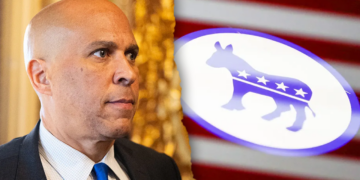
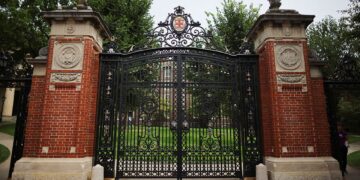

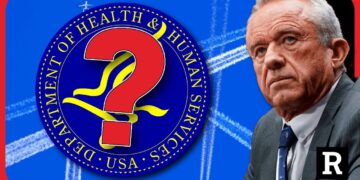



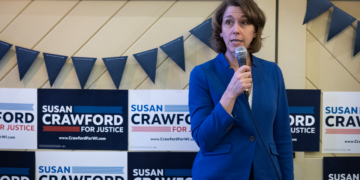























 Reaction & Commentary
Reaction & Commentary





